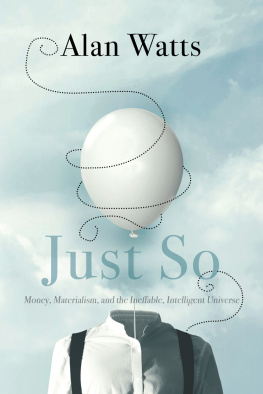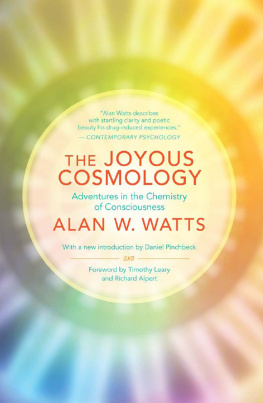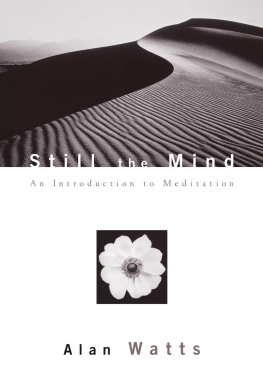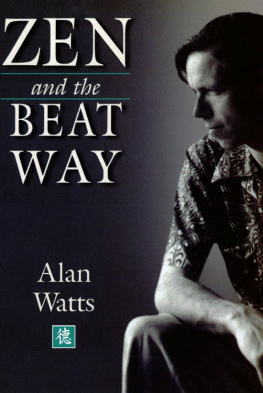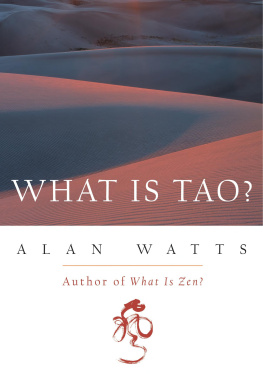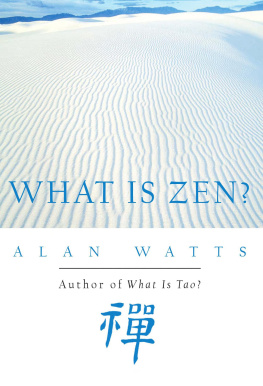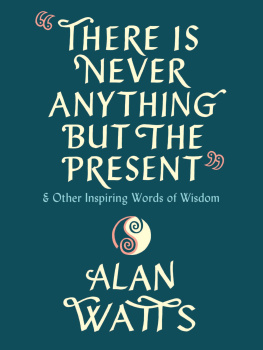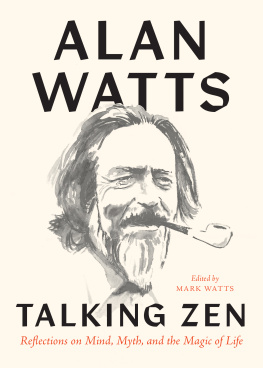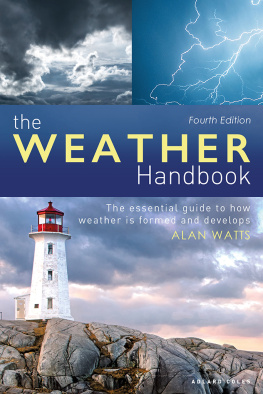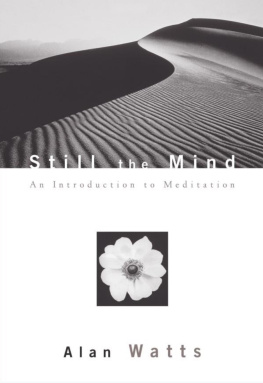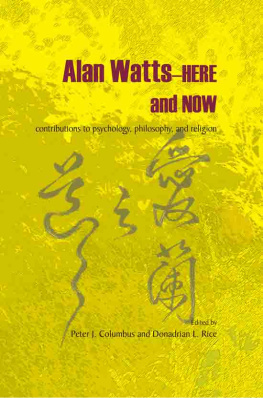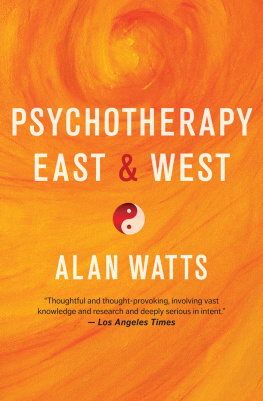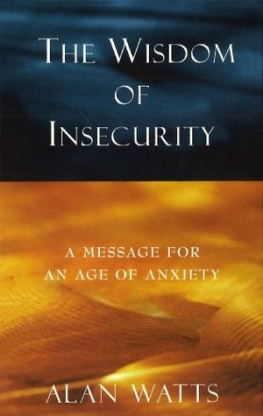Contents
Guide


Contents
About This Book
The edited talks used in Just So were originally recorded decades ago on the ferryboat SS Vallejo, the home and studio of Alan Watts, which was docked at the north end of Sausalito, California. His son, Mark, had been recording Wattss public lectures across the United States for years and in 1972 began to compile audio college courses based on these recordings. The first of these audio courses were offered on cassette, which at the time allowed for widespread mobile listening in cars and on portable decks.
After Watts passed away in 1973, Mark continued to develop courses based on his fathers work and established the Alan Watts Electronic University out of a cabin on the slopes of Mount Tamalpais in Marin County. Mark also created the Love of Wisdom radio series founded on his fathers talks, repurposed much of Wattss material in digital media, produced Why Not Now? (a retro-media collage about his fathers life), and continues to work on a number of forthcoming archival and creative projects. Like Out of Your Mind (Sounds True, 2017), Just So is an editorial collaboration with Robert Lee.
Going With
A s Westerners, were accustomed to using a certain kind of language as well as a certain kind of logic that comes with that language. To begin with, were used to thinking of the world and describing it in terms of particles an assortment of particles bouncing around in some orderly fashion, much as in the game of billiards. We think about our psychology, our bodies, and our relationships to the outside world in the billiard-like terms of Newtonian mechanics, which actually goes back to some of the atomic theories of people like Democritus a pre-Socratic philosopher who lived nearly 2,500 years ago.
Accordingly, we need to begin with some idea about the history of these atomic theories. The very notion of atoms has fascinated people for the longest time. Whats all this stuff made of? What comprises the world, the human body?
Well, theres one straightforward way to find out whats inside a particular structure or organism, and thats to take a knife and chop the thing in two. Of course, when you do that, you now have two pieces of the thing you started out with, but you also discover in the process that the interior of that particular thing has its own structure. And in the example of the human body, that particular structure involves bones, tissues, organs, and so on.
This discovery invites further inquiry in turn. What, then, are organs made of? Chopping them up reveals yet more structures and even smaller components, which encourages us to keep chopping, and we keep doing that until weve got pieces that are so small theyre the same width as the edge of our knife. So we cant cut or break these pieces down until someone invents a better knife, one with an even keener edge.
Through this process, we eventually discover or believe we discover pieces so tiny that they can no longer be reduced to smaller components. For the longest time, these fundamental components were called atoms. In Greek, the word for indivisible is atomas, which we can divide into the components a (non) and temnein (to cut). So an atom was proposed to be the smallest particle of matter that could no longer be sliced down into smaller particles. This was the originating idea for Democrituss atomism, which conceives that the world is built up in the same sort of way that a house is constructed of bricks or stones, with smaller fragments contributing to a larger whole. In other words, the world itself is a composite of fundamental particles.
For some reason, these fundamental particles were conceived of as little balls, probably because balls can prove somewhat difficult to cut. Try slicing a billiard ball with a sword sometime it will mostly likely jump off to one side of the cut. Actually, I should say that the early notions of atoms asserted that atoms of liquid substances resembled balls. Atoms of solids, on the other hand, were envisioned as cubes because cubes stack together rather firmly. Liquids slosh around all over the place, so they must have been spherical. Furthermore, if I recall correctly, the atoms that were said to make up fire were supposedly shaped like pyramids. I cant remember what air atoms were supposed to look like maybe sausages or something like that.
Fundamentally, these are the underlying ideas that make up Western thought. Even today, we think of atoms and subatomic particles in the same way we envision larger planetary systems. These impossibly small components move around and around each other and occasionally bang into and off each other in a predictable fashion, as I said before just as one finds in the game of billiards.
Needless to say, the Newtonian billiard-based model wont do anymore. You cant simply explain the movement of atoms as a series of sequential collisions. Things just dont behave that way, and the reason they dont behave that way is because they are not separate from each other in the first place you can identify different waves, but its still just one ocean waving. And even when you single out one individual wave, youll never find a crest without a trough. Half waves dont appear in nature. In the same way, you never find solids without space or space without solids they are different aspects of each other. Positive and negative poles are always found together, too, and an electric current requires both in order to flow. Just so, individuals and their environments exist in polar relationship as different aspects of a single energy.
It isnt correct to say that were all one huge being, either. Existence is composed of being and nonbeing, solid and space, crest and trough. Fundamentally, the energy of the world is vibratory on and off and youll never find one without the other. To be or not to be is certainly not the question because to be implies not to be, just as not to be implies to be.
Theology and the Laws of Nature
The language and logic we use about the world especially when it comes to the laws of nature also come from our theology. The theology that most of us inherited and grew up with is decidedly Judeo-Christian, which means that the image of the universe we have acquired is basically monarchical. Our way of thinking comes from a culture that conceives of the world as a construct evoked out of nothingness by the commandment of a celestial king.
I dont suppose that those of you reading this who happen to be Christians and Jews still hold to some naive idea of God. That being said, the main thing that I want to get across here is that most of our ideas of God our images, symbols, and mythological forms we use to describe the divine have an extremely powerful influence on our feelings and on the ways we behave.
For example, when I was a child, I was a member of the Church of England. In the Church of England, its quite obvious from an emotional point of view as distinct from an intellectual point of view that God stands behind the king of England. And it was perfectly clear, especially as a small boy, that the king and the archbishop of Canterbury and the whole hierarchy of lords, ladies, and officials descending from them were somehow intimately involved with the hierarchy of heaven.
At morning prayer, to which we went every Sunday, the minister would pray, O Almighty Father, High and Mighty King of Kings, Lord of Lords, the Only Ruler of Princes who dost from thy throne behold all the dwellers upon earth, most heartily we beseech thee with thy favor to behold our most gracious sovereign Lord King George... et cetera. And all the clergy in their robes proceeded in a courtly manner to the altar which is a kind of earthly symbol of the throne of heaven where they offered this petition with all proper humility.
Next page
